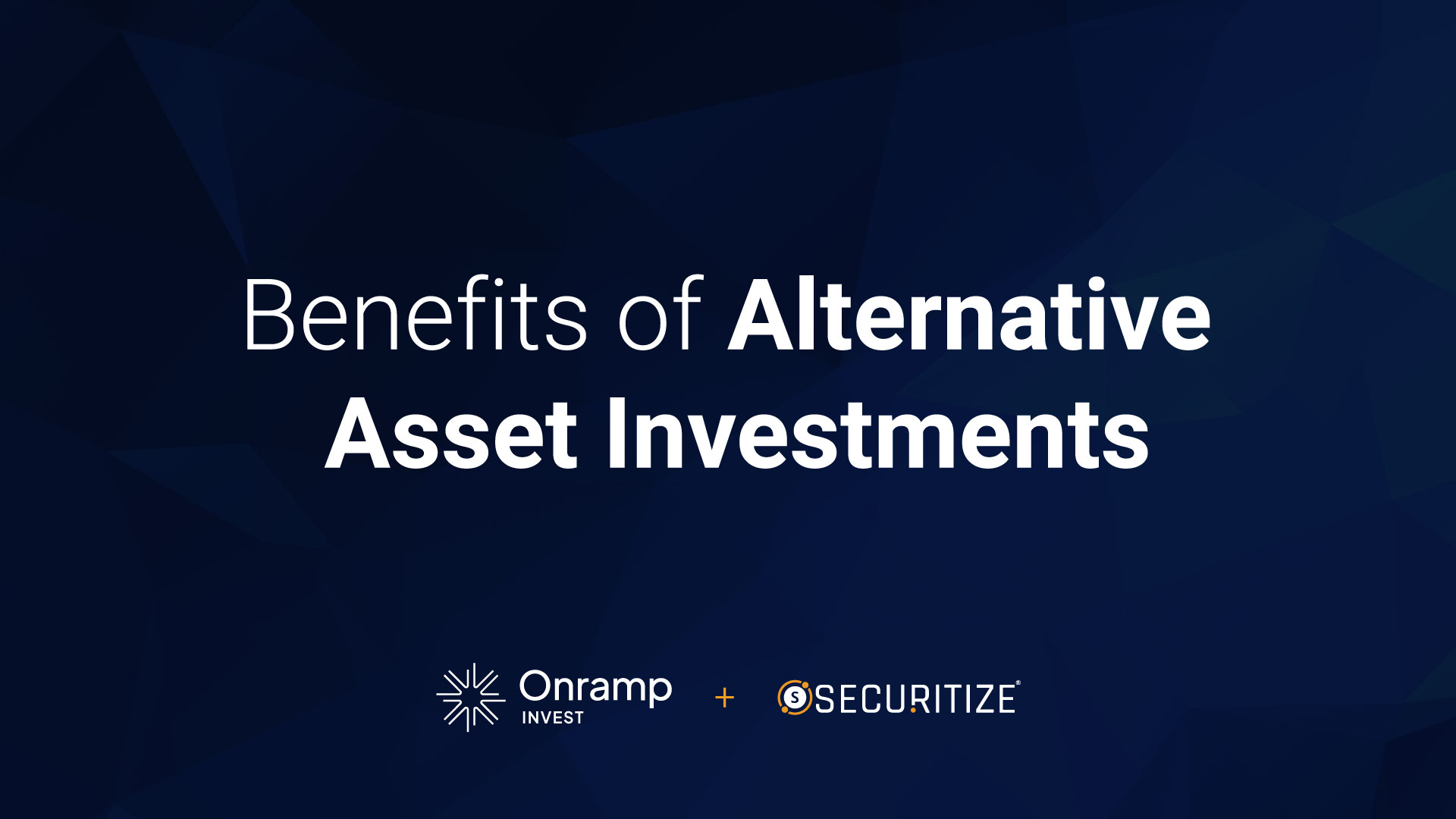
Written by the Securitize Team
Why alternatives? Alternative investments offer opportunities for individual and accredited investors to find better returns, diversify portfolios, realize tax benefits, and lock into predictable and passive cash flows. And these benefits are far more advantageous than you might think. Once only accessible to select institutions and high-net-worth clients, alternative assets are emerging as an attractive investment class for individual and accredited investors.
So, what are they? Alternative assets include a wide range of assets, including hedge funds, venture capital funds, private equity funds, REITs, crypto-related products, private debt, and other non-traditional investments.
Alternative investments provide a wide range of benefits.
- Diversification: Generating returns from a broad array of uncorrelated, non-public assets and diversifying outside the public markets is a key factor in reducing risk and volatility in a portfolio. Diversifying through alts can reduce a portfolio’s overall risk due to their often low correlation to typical stock and bond allocations, meaning if the stock market plunges, select alternative investments may remain steady or even appreciate to help hedge your portfolio.
- Higher returns potential: Alternatives have the potential to generate higher returns than public market investments. Just look at private equity, it’s outperformed the S&P 500 by more than 70%. Such higher returns may come from investing in assets with higher credit risk, greater liquidity risk, increased leverage, or more complex or nuanced assets than typical public investments.
- Access to unique technologies and markets: Alternatives provide access to crypto and DeFi (decentralized finance) portfolios and technologies that otherwise are hard to find in traditional markets. It’s often the case that new investment opportunities, which can offer significant return potential and unique exposure, appear in the private alt market first.
- Tax advantages: Some alternative investments are designed to produce sizable tax benefits for investors. The energy sector is well known for producing large tax write-offs, and enterprise zones in some metropolitan regions allow companies to tap into capital and operate on a tax-advantaged basis, aiding returns.
- Passive income: Many alternatives are structured to provide a high level of income with capital appreciation opportunities. Real estate, energy, DeFi, commodities, and yields from DeFi strategies typically aim to create these income opportunities for investors.
- Access to high-quality strategies: Some of the brightest investment professionals find their way to the alternative markets as portfolio managers, entrepreneurs, venture capitalists, private equity managers, or other financiers. Oftentimes access to take advantage of their strategies is limited to the alternative market.
Considerations for Alternative Investments
Here are some considerations that an investor should keep in mind when thinking about exploring alternative markets:
- Liquidity: When thinking about alternatives, liquidity may be one of your main concerns. This is because some alts require that investors remain invested for several years, and for most alts, there is no active secondary market. Companies like Securitize are building the critical infrastructure and investor networks necessary to create an effective peer-to-peer trading ecosystem where you can find a path to liquidity of these assets.
- Transaction expenses: Typically, alternative investment transactions are primary issuances that require an abundance of documentation and due diligence. Historically, they have been accessible only to a relatively small universe of investors and have commanded fees that exceed those of public market transactions.
As secondary market volumes grow and transactional friction decreases with increased tokenization, fees in the alternative markets are expected to compress. And lower fees translate into maximizing your returns.
- Investment horizon: Some alternative investments have minimum holding requirements. And given the historical lack of a liquid secondary market, the investment horizon for most alternative investments exceeds that of publicly traded securities.
Yet, we expect investment horizons to decrease as the secondary market gains depth and velocity leaving less need for these investments to be held until maturity.
Alternative investments provide investors with numerous benefits that can be an essential part of a diversified portfolio. Until recently, this class was largely unavailable to investors, and many concerns surrounding them made average investors weary. With advances in technology, these investments are becoming more common as a cornerstone of diversification and sound portfolio management, driving growth in the alternative market to $17 trillion by 2025.
Digital asset securities or security tokens are the future of how we’ll invest in alternatives. As the secondary market develops, more retail and accredited investors will discover a multi-trillion-dollar market filled with opportunities to achieve higher returns, diversification, tax benefits, and access to some of the best strategies in finance and technology.
Interested in learning more about Securitize and the funds they have available for investment? Fill out the form below, and someone from their team will reach out to you shortly.
Disclaimer: This is not investment advice. The content is for informational purposes only, you should not construe any such information or other material as legal, tax, investment, financial, or other advice. Nothing contained constitutes a solicitation, recommendation, endorsement, or offer to buy or sell any securities or other financial instruments in this or in any other jurisdiction in which such solicitation or offer would be unlawful under the securities laws of such jurisdiction. All Content is information of a general nature and does not address the circumstances of any particular individual or entity. Opinions expressed are solely my own and do not express the views or opinions of Blockforce Capital or Onramp Invest.
